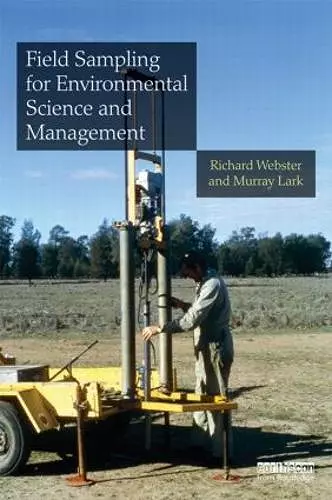Field Sampling for Environmental Science and Management
Richard Webster author Murray Lark author
Format:Paperback
Publisher:Taylor & Francis Ltd
Published:16th Jul '12
Currently unavailable, and unfortunately no date known when it will be back
This paperback is available in another edition too:
- Hardback£145.00(9781849713672)

Scientists and consultants need to estimate and map properties of the terrestrial environment. These include plant nutrients and parasites in soil, gaseous emissions from soil, pollutant metals and xenobiotics in waste and contaminated land, salt in groundwater and species abundances above ground. The scale varies from small experimental plots to catchments, and the land may be enclosed in fields or be open grassland, forest or desert. Those who sample the variables to obtain the necessary data need guidance on the design and analysis of sampling methods for their conclusions and recommendations to be valid.
This book provides that guidance, backed by sound rationale and statistical theory. It concentrates on design-based sampling for estimates of mean values of environmental properties, emphasizing replication and randomization. It starts with simple random sampling and then progresses to more efficient designs, such as spatially stratified random sampling, stratification by classes and cluster sampling. It includes a section on purposive sampling in classical soil survey, which is relevant to other environmental properties such as vegetation. It also describes the effects of bulking on errors and the use of ancillary information and regression to improve estimates. The authors draw the important distinction between design-based sampling for estimating means and model-based methods (geostatistics) for local spatial prediction and mapping, and focus on the latter. They describe designs suitable for computing variograms and prediction by kriging, as well as a staged approach, so that sampling is neither inadequate nor excessive, and designs adapt as knowledge is accumulated. Including numerous worked case studies of sampling in agriculture, ecology and environmental science, the book will be of immediate practical value.
"The book is written in a very educational style with a practical lay-out allowing easy access. Every chapter is introduced by a box overviewing its key points and most contain practical worked examples using real-world data. A sample data set is also provided. Most of the material discussed is backed-up by previously published papers by the authors and hence extra information is available if needed. The book clearly achieves its objective. It is highly recommended to all researchers whohave to sample and find the standard text books too complicated. It is also a perfect book for students in many disciplines."–Marc Van Meirvenne, Ghent University
ISBN: 9781849713689
Dimensions: unknown
Weight: 370g
192 pages